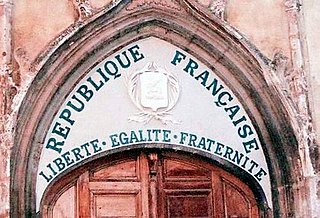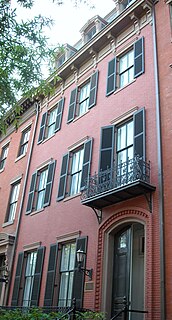Secular humanism, or simply humanism, is a philosophy or life stance that embraces human reason, ethics, and philosophical naturalism while specifically rejecting religious dogma, supernaturalism, pseudoscience, and superstition as the basis of morality and decision making.
The Christian right or the religious right are conservative Christian political factions that are characterized by their strong support of socially conservative policies. Christian conservatives principally seek to apply their understanding of the teachings of Christianity to politics and to public policy by proclaiming the value of those teachings or by seeking to use those teachings to influence law and public policy.

In English church history, a Nonconformist was a Protestant who did not "conform" to the governance and usages of the established Church of England. Broad use of the term was precipitated after the Restoration of the British monarchy in 1660, when the Act of Uniformity 1662 re-established the opponents of reform within the Church of England. By the late 19th century the term specifically included the Reformed Christians, plus the Baptists and Methodists. The English Dissenters such as the Puritans who violated the Act of Uniformity 1559—typically by practising radical, sometimes separatist, dissent—were retrospectively labelled as Nonconformists.
The separation of church and state is a philosophic and jurisprudential concept for defining political distance in the relationship between religious organizations and the nation state. Conceptually, the term refers to the creation of a secular state and to disestablishment, the changing of an existing, formal relationship between the church and the state.

Maurice Le Noblet Duplessis served as the 16th Premier of the Canadian province of Quebec from 1936 to 1939 and 1944 to 1959. He rose to power after uniting his Conservative party and the breakaway Action liberale nationale progressive faction of the Liberal party of Premier Louis-Alexandre Taschereau, to form a new conservative party, the Union Nationale.

The Liberals is a liberal and social-liberal political party in Sweden. It was a part of the Alliance centre-right coalition government led by Prime Minister Fredrik Reinfeldt from 2006 to 2014. The party is the seventh-largest party in the Swedish Riksdag. Until 22 November 2015 it was known as the Liberal People's Party. The party is a member of the Liberal International and Alliance of Liberals and Democrats for Europe.
The Evangelical Lutheran Church in America (ELCA) is a mainline Protestant Lutheran Church headquartered in Chicago, Illinois. The ELCA officially came into existence on January 1, 1988, by the merging of three Lutheran church bodies. As of 2017, it has approximately 3.5 million baptized members in 9,163 congregations. In 2015, Pew Research estimated that 1.4 percent of the U.S. population self-identifies with the ELCA. It is the seventh-largest religious body and the largest Lutheran denomination in the United States. The next two largest Lutheran denominations are the Lutheran Church–Missouri Synod (LCMS) and the Wisconsin Evangelical Lutheran Synod (WELS). There are also many smaller Lutheran church bodies in the United States, some of which came into being composed of dissidents following the major 1988 merger. The ELCA belongs to the World Council of Churches and the Lutheran World Federation. The ELCA is in full communion with the Episcopal Church, Moravian Church, Presbyterian Church (USA), Reformed Church in America, United Church of Christ, and the United Methodist Church.
A caucus is a meeting of supporters or members of a specific political party or movement. The term originated in the United States, but has spread to Australia, Canada, New Zealand, South Africa and Nepal. As the use of the term has been expanded, the exact definition has come to vary among political cultures.
Kulturkampf is a German term referring to the conflict between the German imperial government and the Roman Catholic Church from about 1872 to 1886, predominantly over the control of educational and ecclesiastical appointments. More rarely, the term is used by extension to refer to the power struggles between emerging constitutional democratic nation states and the Roman Catholic Church over the place and role of religion in modern polity, usually in connection with secularization campaigns.

Laïcité, literally "secularity", is a French concept of secularism. It discourages religious involvement in government affairs, especially religious influence in the determination of state policies; it also forbids government involvement in religious affairs, and especially prohibits government influence in the determination of religion.
Anti-clericalism is opposition to religious authority, typically in social or political matters. Historical anti-clericalism has mainly been opposed to the influence of Roman Catholicism. Anti-clericalism is related to secularism, which seeks to remove the church from all aspects of public and political life, and its involvement in the everyday life of the citizen.

Broad church is latitudinarian churchmanship in the Church of England in particular and Anglicanism in general. The term is often used for secular political organisations, meaning that they encompass a broad range of opinion.

The Family First Party was a conservative political party in Australia, in existence from 2002 to 2017. It was founded in South Australia and enjoyed its greatest popularity in that state.

In modern English, the term cult has come to usually refer to a social group defined by its unusual religious, spiritual, or philosophical beliefs, or its common interest in a particular personality, object or goal. This sense of the term is controversial and it has divergent definitions in both popular culture and academia and it also has been an ongoing source of contention among scholars across several fields of study. It is usually considered pejorative.

The White House Office of Faith-Based and Neighborhood Partnerships, formerly the White House Office of Faith-Based and Community Initiatives (OFBCI) is an office within the White House Office that is part of the Executive Office of the President of the United States.
Barry W. Lynn was the executive director of Americans United for Separation of Church and State from 1992 to November 2017. He is an ordained minister in the United Church of Christ and a prominent leader of the religious left in the United States. He is known to be a strong advocate of separation of church and state.
A 501(c)(3) organization is a corporation, trust, unincorporated association, or other type of organization exempt from federal income tax under section 501(c)(3) of Title 26 of the United States Code. It is one of the 29 types of 501(c) nonprofit organizations in the US.

The Church of Scientology has operated in Germany since 1970. German authorities estimate that there are 4,000 active Scientologists in Germany as of 2012; the Church of Scientology gives a membership figure of around 12,000. The Church of Scientology has encountered particular antagonism from the German press and government and occupies a precarious legal, social and cultural position in Germany.
Dean M. Kelley was an American legal scholar, religious freedom advocate, author, and executive with the National Council of Churches (NCC), where his work was mainly concerned with religious liberty issues. He also served on the board of the American Civil Liberties Union (ACLU).












